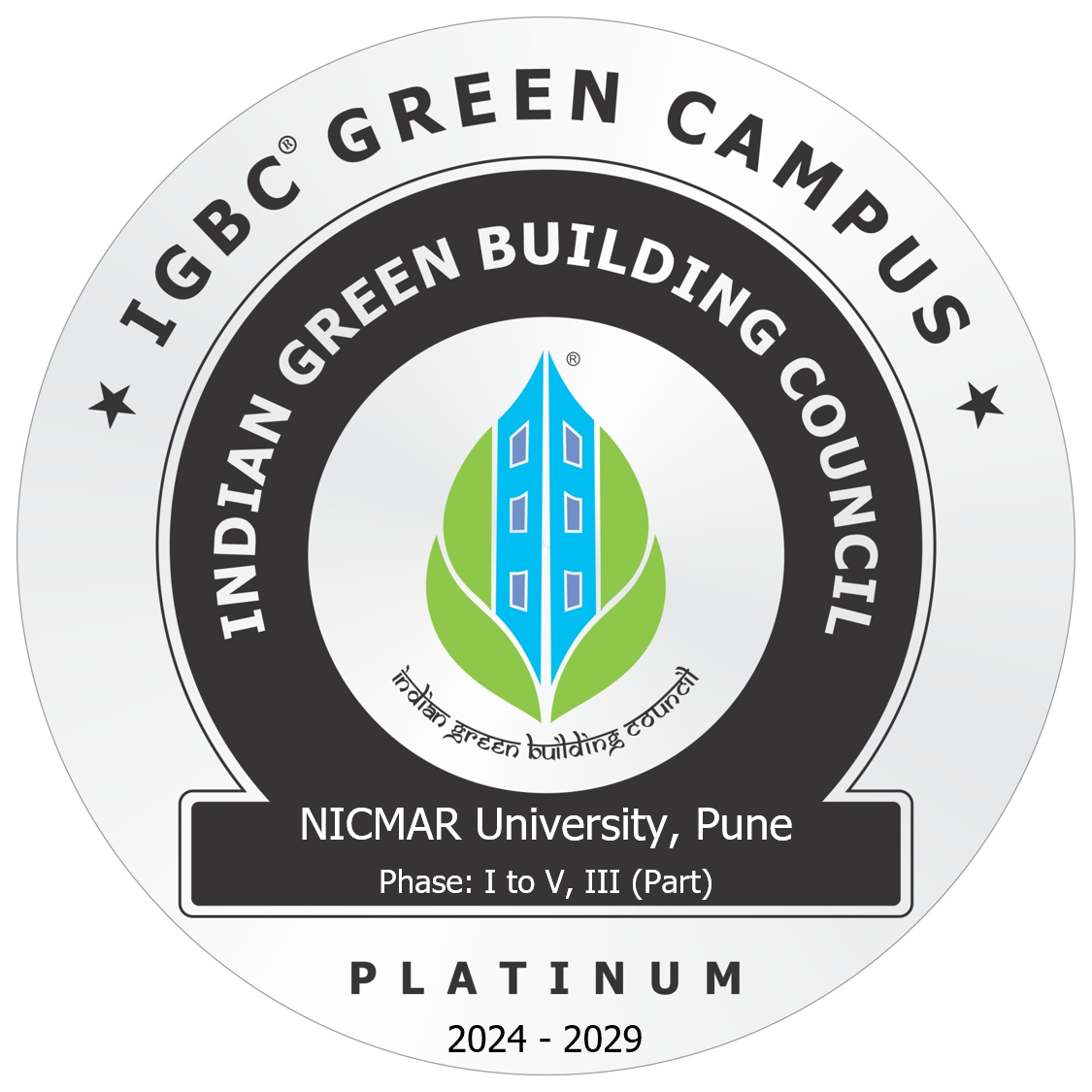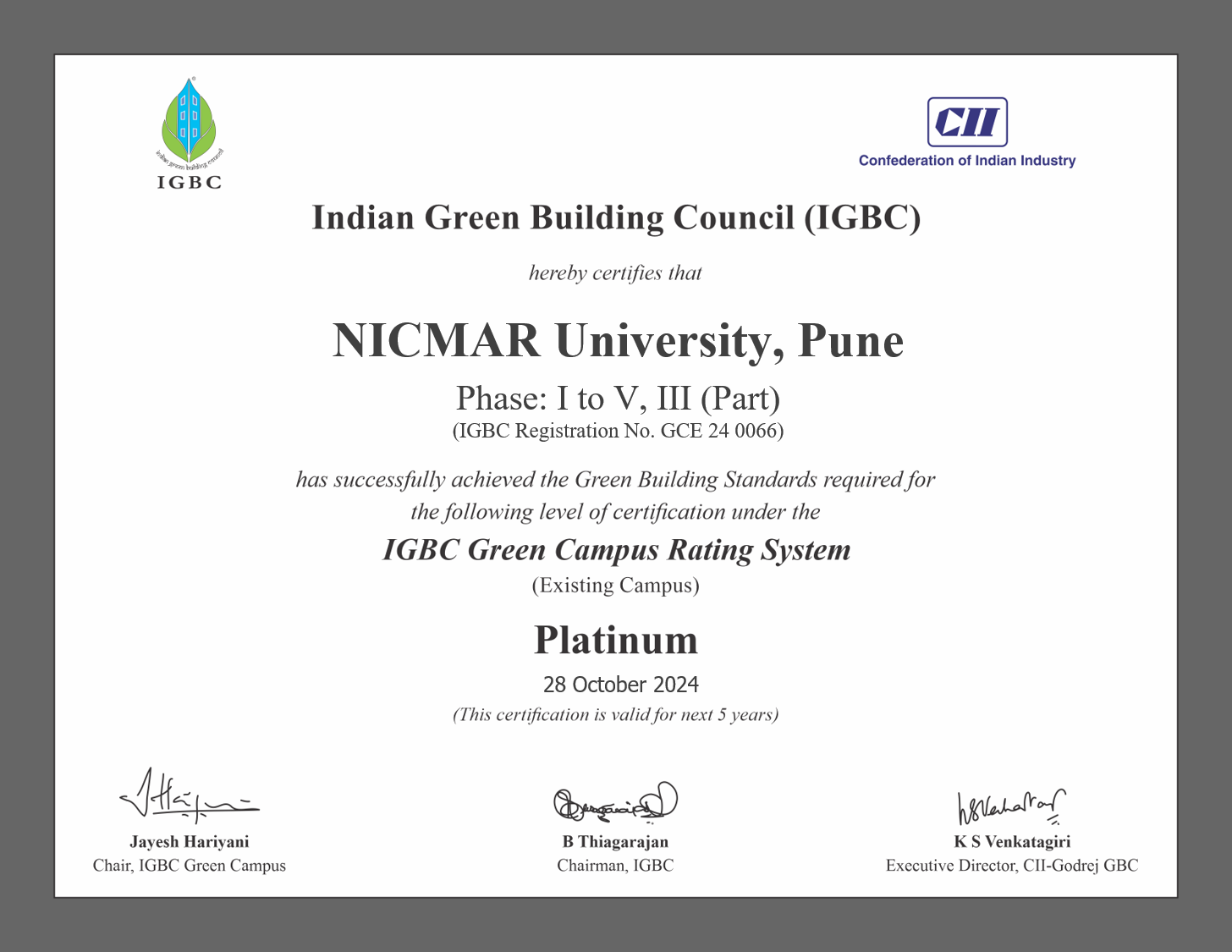Overview
Embark on a journey of mindful architectural exploration, guided by a meticulously crafted pedagogy that embraces the winds of change sweeping across the nation's education landscape. Our mission: to bridge the gap between architectural education and professional practice, nurturing visionary architects who shape the fabric of our nation's socio-economic growth.
Unleash your potential
What You'll Learn
The B.Arch programme is your gateway to cultivating independent and critical thinking in architecture while mastering essential designing, technical, and software skills demanded by the industry.
- Holistic Professional Development: Gain high-quality architecture education that covers all facets of the Construction, Real Estate, and Infrastructure projects industry, ensuring comprehensive professional development.
- Environmental Sustainability Focus: Foster an awareness of changing development scenarios and technology to encourage environmental sustainability and responsible design practices.
- Skills for Professional Success: Develop state-of-the-art digital skill sets, critical thinking, and analytical problem-solving abilities for successful professional employment and licensure.
Take a peek
Programme at a Glance
Spread across 10 exciting semesters, the B.Arch programme empowers you to shape the world with a fusion of art, design, and architectural mastery.
Programme Duration
A comprehensive five-year journey is divided into ten semesters, providing you with suitable breaks along the way.
Diverse Learning Components
Each semester immerses you in a diverse range of learning components, including studio work, classroom sessions, tutorials, fieldwork, and hands-on experience with software applications.
Progressive Course Structure
Delve into an enriching curriculum that focuses on Professional Core (PC), Building Sciences and Applied Engineering (BS and AE) courses. These courses will introduce you to essential concepts such as design, construction materials, graphics, working drawings, model making, architectural history, and structures. The programme provides you with invaluable design and industry experience through an internship, thesis, and a range of professional & open electives.
Pune Campus
Seamlessly blending with Baner’s elite, cutting-edge
lifestyle, our Pune campus will leave you enchanted with its
state-of-the-art learning and living facilities.

Courses
- Sem. 1
- Sem. 2
- Sem. 3
- Sem. 4
- Sem. 5
- Sem. 6
- Sem. 7
- Sem. 8
- Sem. 9
- Sem. 10
Semester 1
The first semester of the B.Arch programme kicks off with the fundamental principles of design, including elements such as form, color, and texture, enabling you to create visually captivating compositions. Explore the behavior of building elements and their structural implications, mastering analytical thinking in architectural design.
Develop your drawing skills, utilizing techniques and projections to visualize objects in three dimensions. Delve into the socio-cultural, political, and economic contexts of ancient civilizations, unraveling the link between architecture and its surroundings.
Discover the art of model making as a powerful tool for exploring and representing architectural forms and spaces. Acquire essential knowledge of applied mechanics, equipping you with a solid foundation in forces, equilibrium, and structural behavior.
Apply Now- Basic Design & Visual Arts
To introduce the elements and principles of design, tools to enhance creativity, and basics of space making
- Building Construction and Materials- I
To familiarize students to the traditional materials and processes of building construction applicable To simple low-rise single or two-storied structures.
- Architectural Drawing & Graphics- I
To equip students to represent their design thinking through appropriate graphical representation
- His Tory of Architecture- I
To understand the evolution of early architecture in different geographical, climatic, socio-cultural, and political contexts.
- Clima Tology
To understand the role of climate in architectural designing and encourage students to adopt climate responsive design
- Architectural Mathematics and Geometry
To develop basic skills in geometry and mathematics required for designing and computing in architecture
- Model Making Workshop - I
To familiarize students to various architectural model making materials and techniques and encourage them To use models as a Tool for visualization and communication in architecture.
Semester 2
The second semester builds upon the concepts of Semester 1 by diving deeper into them. Learn more about the world of architecture, exploring the essential aspects of decision-making, including anthropometry, climate, form, function, structure, and materials. Delve into the intricate qualities of space, considering socio-cultural and geographical factors that shape design. Develop a solid understanding of basic building elements, with a focus on timber construction. Unleash your creativity through expressive graphical projections, visualizing complex three-dimensional objects and buildings.
Immerse yourself in the rich history of India's architectural development, gaining insights into settlements, culture, and landscapes. Hone your modeling skills, blending traditional and digital techniques to create architectural masterpieces. Gain proficiency in AutoCAD software for precise and stunning designs.
Finally, embrace the significance of climate in architectural design, enabling you to craft climate-responsive solutions that harmonize with the environment.
Apply Now- Architectural Design - I
To introduce Architectural Design as the ideation of a functional space crafted by robust elements in an aesthetic manner
- Building Construction and Materials- II
To develop a fundamental understanding of function and behaviour of Timber construction under various condition.
- Architectural Drawing & Graphics- II
To introduce students to design elements in three-dimensional forms and space leading To classical methods of architectural form development, theory and application of colours
- His Tory of Architecture – II
To introduce students to the developments in architecture of the Indian sub-continent after 12th century AD as a result of the social, political, and geographical contexts.
- Model Making Workshop - II
To Introduce different techniques of model making in various materials and basic processes for fabrication and assembly of simple building components.
- Structural Design and Systems- I
To introduce simple structural concepts and behaviour of structural elements, and to understand their significance and application in architecture.
- Computer Applications- I
To enable the students to communicate an architectural idea / proposal in a legible and effective manner through various architectural presentations and rendering techniques.
Semester 3
Explore the foundations of architecture, delving into soil studies, RCC principles, and innovative smaller space designs. Unleash your creativity through expressive graphical projections, bringing composite three-dimensional objects to life.
Dive into the captivating history of European architecture up until the 17th century AD, gaining insights into its evolution. Refine your craft through hands-on model making, utilizing diverse materials. Deepen your understanding of structural elements, including torsion, fixity, continuity, and loading, with a focus on wood and concrete.
Embrace the latest surveying gadgets and fieldwork tools for accurate site analysis. Expand your horizons with an open elective from a curated list of courses, further enriching your architectural journey.
Apply Now- Architectural Design - II
To appreciate the site and its context and their value as prime genera Tors of design.
- Building Construction and Materials - III
To introduce students to different building materials related To RCC construction
- Computer Applications- II
To enable the students to generate 3D models of objects and buildings using 3D CAD software
- His Tory of Architecture – III
To understand in depth the evolution of classical architecture in the west, and its various stylistic modes characterized by technology, ornamentation and planning practices.
- Building Services - I
To acquaint students with the principles of water supply and drainage, standards and codes, and design considerations for plumbing systems in buildings.
- Structural Design and Systems- II
To introduce complex structural systems.
- Surveying and Levelling
To introduce the principles and various fac Tors related to Topographical survey, analysis and their application in Architectural Site Planning
Semester 4
In this semester, you will engage in a design project that introduces the concept of site planning, creating multiple built spaces. You will learn about the principles of RCC construction, specifically focusing on cantilever slabs and staircases. The courses will emphasize your preparation of working drawings for architectural projects and help you understand their importance in on-site execution and tender documents.
Additionally, you will explore the architecture of the post-medieval Western World and gain practical experience in architectural model making using various materials.
Apply Now- Architectural Design-III
To appreciate site and surroundings as an essential part to design a group of buildings.
- Building Construction and Materials- IV
To understand the principles of RCC design and vertical transportation systems.
- His Tory of Architecture – IV
To introduce students to the architectural developments in the industrial and post-industrial era along with different critical theories.
- Landscape Architecture
To introduce students to the various principles of landscape design and site planning
- Structural Design and Systems- III
To design various elements of RCC Superstructure
- Building Services – II
To understand the services in low to mid rise buildings and their integration in architectural design
Semester 5
In this semester, you unleash your creativity in campus design, exploring the relationship between built and open spaces. Dive into the fascinating world of frame structures, mastering different types of slabs and pre-stressed RCC technology. Discover the art of design development and detailing, transforming conceptual designs into intricate working drawings.
Gain insights into structural elements and building services, while selecting a professional elective to further expand your knowledge and skills.
Apply Now- Architectural Design-IV
- Building Construction and Materials - V
- Working Drawing - I
- Structural Design and Systems- IV (Advanced)
- Building Services- III
- Computational design
- Open Elective - II
Semester 6
The sixth semester allows you to delve into system-oriented projects, exploring structural systems, circulation, and essential services. Unleash your creativity in designing with steel, incorporating earthquake-resistant structures and exploring innovative construction practices. Gain insights into estimating quantities for architectural projects and master software tools like Revit and Photoshop for stunning visualizations.
Additionally, select an open elective from a wide range of options to further enrich your learning experience.
Apply Now- Architectural Design-V
- Building Construction and Materials- VI
- Estimation, Specification and Costing
- Computer Applications- III (BIM)
- Research in Architecture - I
- Working Drawing -II
- Professional Elective- I
Semester 7
In the seventh semester, you dive deep into architectural design as you develop a comprehensive project. Explore diverse aspects such as sociocultural influences, economic considerations, site context, and typologies to shape your design decisions. Dive into the realm of advanced structural systems, materials, and services, honing your skills to seamlessly integrate them into architectural design. Gain a deep understanding of the architect's role, responsibilities, and ethical standards in society.
Unleash your creativity in writing specifications, rate analysis, and quantity estimation for industrial structures. Discover the power of coding and R in architecture and planning, while honing your communication and report writing skills. Expand your horizons by selecting professional electives that align with your passions and aspirations.
Apply Now- Architectural Design-VI
- Advanced Building Construction and Materials- I
- Professional Practice
- Project Management
- Research in Architecture - II
- Professional Elective- II
- Open Elective - III
Semester 8
Brace yourself for a creative exploration of designing intricate urban spaces and diverse buildings beyond housing, taking into account factors such as area, function, specific communities, and contextual considerations. Delve into the realm of advanced structural systems, materials, and services, equipping yourself with the knowledge to tackle complex and specialized building requirements.
Hone your research skills to delve into critical issues of the built environment, preparing you to write impactful technical research papers. Broaden your horizons by selecting professional electives that align with your interests and aspirations.
Apply Now- Architectural Design-VII
- Contemporary processes in Architecture
- Dissertation
- Urban Studies
- Professional Elective - III
- Entrepreneurship Skills
Semester 9
The ninth semester allows you to undergo training under a professional to learn about management, execution, design process, and site work.
Apply Now-
Professional Training
Undergo training under a professional to learn about management, execution, design process, and site work.
Semester 10
In the final semester, you cultivate an entrepreneurial spirit as an "Archipreneur," gaining essential skills in management, legal aspects, and exploring new opportunities. Master the popular BIM software, expanding your technical expertise. Customize your learning journey with professional electives from a diverse range of options.
Apply Now- Architectural Design Thesis
- Professional Elective- IV
- Open Elective - IV
An enriching environment
Class Profile
Join a diverse community of learners who have passed their Class XII Board exams, and are ready to transform the world with their ideas and hard work.

-
18
Average age
-
7
Average Courses Each Semester
-
28
Average Credits Per Semester
Dr. Supriya Nene
Professor & Dean, School of Architecture & Planning
Dr. Supriya Nene has thirty years of academic and professional experience in the USA and in India combined. She enjoys academics and has keen interest in progressive approach and concepts of sustainable development. Dr. Supriya graduated from Maharaja Sayajirao University Vadodara, in Architecture in 1992. She achieved her Master’s degree MS-Architecture with specialization in Computer Applications with full University Grants Scholarship and Research Assistantship from University of Cincinnati, Ohio, USA in 1998. She received her Doctorate in Architecture from CEPT University, Ahmedabad in 2015. She is a registered Architect with the Council of Architecture, India and Associate of the Indian Institute of Architects, Pune chapter. She is also IGBC Accredited Professional and GRIHA trainer.
Dr. Nene has written and presented many research papers at national and international forums. She has been invited on professional and academic committees by various bodies and universities. As a professional Architect, she has worked on infrastructure, commercial and institutional projects from design development to coordination with consultants for execution of the projects in various capacities. She is an entrepreneur in the field of built environment and international education. She is also a painter and has won many accolades and held exhibitions of her works.
Get started
Admission & degree requirements
As per CoA norms, below are the eligibility criteria for B-Arch Programme:
- Qualify for National Aptitude Test in Architecture (NATA)/ JEE Paper 2
- Passed 10+2 or equivalent examination with Physics and Mathematics as
compulsory subjects along with either Chemistry or Biology or Technical Vocational subject
or Computer Science or Information Technology or Informatics Practices or Engineering
Graphics or Business Studies with at least 45% marks in aggregateOR
- Passed 10+3 Diploma Examination with Mathematics as a compulsory subject with at least 45% marks in aggregate.
Your trajectory
Career opportunities
As a B.Arch graduate, you can pursue the following careers:
| Architect | Architecture Designer | Architectural Assistant | Architectural Historian/Journalist |
| Project Assistant Manager | Architecture Designer | Architecture Engineer | Building Contractor |
| Interior Designer | Architecture Draftsman | Technical Assistant | Landscape Architect |
| Project Architect | Interior Designer | Assistant Professor | Senior Project Architect |
| Urban Planner | Design Manager | Interior Architect | Design Architect |
| Site Manager | Researcher |
| M. Arch, Master of Urban Design (M. Des) | Masters in Project Management | M. Planning |
| M. Arch in Landscape Design | M. Design in Interior Architecture | Masters in Graphic Design, |
| Master of Building Engineering and Management, | M. Design in Industrial Design |
FAQs
-
Is a science background (PCM) in class 12th compulsory to pursue the B.Arch
Programme?
Yes! As per the regulation from Council of Architecture (COA):
No candidate shall be admitted to the architecture programme unless she/he has passed:
(i) An examination at the end of the 10+2 scheme of examination with 50% marks in Physics, Chemistry and Mathematics and also 50% marks in aggregate of the 10+2 level examination.
OR
(ii) 10+3 Diploma Examination with Mathematics as a compulsory subject, with at least 50% marks in aggregate. -
How are the placement prospects of the B.Arch?
We're proud of the industry connections we've developed and nurtured over the last 30 years, allowing us to invite only the best and most sought-after recruiters for our students. In fact, over 200 companies visit us each year for on-campus placements. During your final year and interim internships, you can expect excellent placement assistance.
-
What kind of financial aid can you help with?
We’ve tied up with India’s leading banks and financial institutions for you to get education loans with utmost ease. These institutions include HDFC Credila, ICICI Bank, Saraswat Co-op Bank, Bank of Baroda, Credenc, Union Bank of India, Avanse, and many others.
-
Is an internship a part of this programme?
Yes, the programme offers a 4-month mandatory in the 5th year.
-
What are some related offerings and certifications that I can consider apart
from
B.Arch?
NICMAR offers a range of undergraduate and postgraduate programmes under different domains such as civil engineering, management, real estate, sustainability and more. The programmes include B.Tech (Civil), Integrated-MBA,, Masters in Planning, and MBA in Advanced Project Management, Advanced Construction Management, Real-Estate And Urban Infrastructure Management, Family Business Management, Environmental Sustainability, Quality Surveying and Contracts Management, and general MBA.
Celebrating our
Graduates
Take a look at our talented learners that transformed into lifelong leaders after passing out with flying colours.
Apply Now
Explore more @ School of Architecture, Planning, and Real Estate
This programme belongs to Architecture, Planning, and Real Estate.
To learn
more about its
offerings, click the button below.

NICMAR University, Pune is Indian Green Building Council (IGBC) Platinum Certified Green Campus


